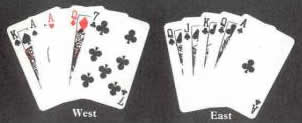ECARTÉ
ECARTÉ is a gambling game, once one of the most popular in France. It requires a knowledge of probabilities ‘only’, and to a player with a complete knowledge of these it is a mechanical game.
NUMBER OF PLAYERS
Ecarté is suitable for two players only.
CARDS
Ecarté is played with a 32-card pack; that is to say with a pack from which the 2s, 3s, 4s, 5s, and 6s have been removed. The cards rank in the order: King (high), Queen, Jack, ace, 10,9,8,7 (low).
The two players are dealt five cards each, either in sets of three and two, or two and three, and the rest of the pack is placed face downwards on the table, between them. To determine trump suit the top poker card of the pack is turned face upwards.
THE PLAY
After looking at his cards, the non-dealer either plays or proposes. If he proposes, the dealer has the choice of either accepting or playing, and if he accepts both players may exchange any or all their cards for others from the pack. By agreement the exchange of cards may continue until the pack is exhausted.
The non-dealer has first lead. The object of the game is to win three tricks, called the trick the winner scores one point for this, and if he wins all five tricks (the Vole) he scores two points.
The game is won by the player who first wins five points, and it is customary to count a treble if a play wins the poker game and his opponent has failed to score; a double if his opponent has scored only one or two points, and a single if his opponent has scored three or four points.
So far, then, Ecarté appears to be childishly simple. The game, however, lends itself to a number of refinements that raise it to the level of an adult game. If the non-dealer does not propose, but plays, and fails to make the trick, the dealer scores two points instead of only one.
In the same way, if the dealer refuses a proposal, and plays, and fails to make the trick, the non-dealer scores two points. The value of the vole (two points) is not affected by playing without proposing.
Another important feature of the game is that if the dealer turns up a King as trumps, or if a player is dealt the king of the trump suit, he scores one point. The point can be scored by the non-dealer only if he declares the King before he makes the opening lead, and by the dealer only if he declares it before he plays to the first trick.
A player is under no compulsion to declare the King, and indeed, sometimes it is better to sacrifice the point than to disclose to the opponent that this important card is held against him.
With the score West three points, East four points, West deals and the ♠ 8 is turned up. The hands are as below.
East decides to play and must win the game if he handles his cards correctly. In the event he loses the game by incautious play. He leads ♣ K on which West plays ♣ 7. West does not declare the ♠ K because East has played without proposing and, therefore, will lose two points if he fails to win the Trick. On the other poker hand, if he wins the Trick, declaring the King will be of no help to West.
East is lulled into a false sense of security, and unaware that the ♠ K is against him he assumes that it is safe to lead ♠ Q. West wins with ♠ K, leads ♦ Q to force East to win with ♠ J, and comes to the last two tricks, and wins the game, with ♠ A and ♥ A.

